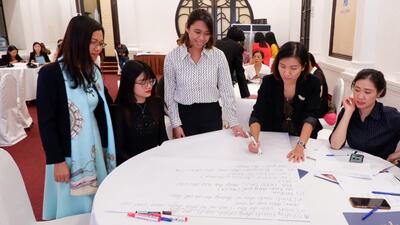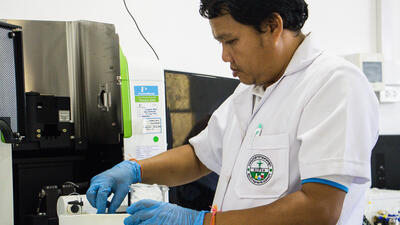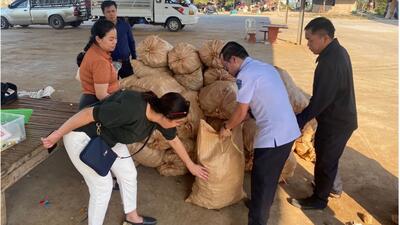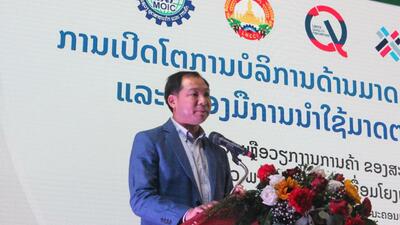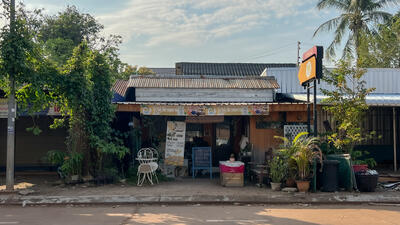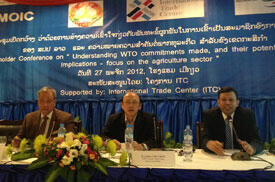
Lao PDR: accession commitments discussed ahead of WTO accession (en)
That was the message at a stakeholder conference on WTO accession in Vientiane, Lao PDR, on November 27th, where private sector representatives, academia, society players and government officials discussed Lao PDR’s WTO accession commitments and possible business implications. The conference was organized by the Lao National Chamber of Commerce and Industry (LNCCI), and the Lao Ministry of Industry and Commerce (MOIC), and supported by ITC.
After more than 15 years of negotiating, WTO members agreed last month on the Protocol of Accession of Lao PDR, paving the way for Laos’ WTO membership in early 2013. The stakeholder conference, on ‘WTO Accession of Lao PDR: Understanding commitments made, and their potential business implications’, was attended by over 60 participants as part of the ITC-WTO Programme on Technical Capacity for WTO Accession of Lao PDR.
Ms Khemmani Pholsena, Vice-Minister of Lao PDR’s Ministry of Industry and Commerce, said: ‘The agreement of the Lao PDR accession package is a milestone for Lao PDR, offering many benefits, though it requires continued and prolonged attention from both the government and the private sector to make best use of the opportunities for economic growth and development offered by WTO membership.’
Mrs Valentine Rugwabiza, WTO Deputy Director-General, said: ‘Accession of Lao PDR, as the last remaining ASEAN nation gaining membership of the WTO, will get the multilateral trading system closer to being truly universal’. She pointed out the greatly improved trade performance of ASEAN countries, Vietnam and Cambodia, following their accession to WTO, and said: ‘Lao PDR will reap the benefits of WTO Membership, with continued reforms to be pursued with the same determination and focus shown by the government during the accession negotiations’.
Officials from the Ministry of Industry and Commerce explained some of the main features of the accession commitments. The Lao PDR will maintain high tariffs for some of the sectors deemed sensitive, including rice, eggs, fruits, steel, chemicals and oils. Whilst it was agreed that implementation of standards related agreements (SPS) would pose challenges for Lao PDR, it was also acknowledged that the country has sufficient comparative advantages, including its climate and fertile lands, to cope with enhanced competition, and deliver high quality agriculture products requested by importing foreign markets.
In the services sectors, it was mentioned that the ASEAN integration process was said to have been the determining factor in the WTO negotiations and the Lao PDR offered some market opening in the areas of banking, insurance, health, education and tourism. In addition, it was mentioned that commitments in the area of services would allow Lao PDR to make use of foreign investments, address domestic shortages (such as in the health sector), and allow the transfer of knowledge and technology for development of those services. Commenting on the implications of the WTO accession package for the private sector, Mr Rajesh Aggarwal, Chief, Business and Trade Policy, ITC, said: ‘Allowing market opening in selected services, such as the banking, telecommunication and transport sectors, is of vital importance for small and landlocked countries, to bring about efficiency and cost effectiveness of backbone services. Improved openings and regulation of services can contribute substantially to improving the Lao PDR business environment and competitiveness of the economy as a whole’. Lao PDR currently ranks 165th out of 181 on the World Bank Doing Business Index whilst the average ranking in Asia is 86.
Following the conclusion of the negotiations, the post-accession phase also represents an opportunity to continue to improve the Lao PDR business environment. Speakers agreed that the WTO membership is just the beginning of the process of integrating deeper into the world trade system. Mr Aggarwal acknowledged ‘the impressive achievement of the Lao PDR Government, in the very balanced accession package negotiated’, and added that ‘yet, the right spirit and broad perspective is needed in the post-accession phase, as there is still so much ground to be covered, in terms of implementing commitments and continued reforms’.
Implications for the Lao PDR agriculture sector, of core importance in terms of productivity, employment and trading opportunities, were also discussed. Finding qualified human resources was mentioned as a main challenge for the country in meeting the commitments of WTO accession, especially in the monitoring and implementation of quality and standards-related commitments, according to the representative from the National University of Lao PDR’s Faculty of Agriculture.
The way forward
Mr Oudet Souavannavong, President of LNCCI, said that the post-accession phase requires prolonged commitment from all stakeholders, and that continued dialogue between the private and public sectors, as well as coordination between line ministries, is needed, to clarify administrative processes, to express business concerns in trading and to further enhance the quality of services offered by government institutions in trading practices, such as customs procedures and licenses.
Participants also agreed that further understanding and awareness needs to be built in the area of trade policy and trade agreements (WTO, ASEAN), in order to ensure that the private sector can play a constructive role in the post-accession phase. The government was told that it should give priority to identifying the potential of specific sectors and supporting a strategic approach to their development while also getting the message across to the provinces.
The role of international partners, such as ITC, was recognised as indispensable in addressing post-accession challenges in areas including implementation commitments, developing strategic approaches to sector development for exporting Lao PDR’s high-value products, and continue to build understanding and to sustain dialogue to enable the private sector to engage on trade policy. Ms Pholsena acknowledged the ‘good works of Lao National Chamber of Commerce and Industry and the International Trade Centre in organizing this conference and in assisting the government to inform and prepare the private sector for WTO membership’.
Parliamentary ratification of the WTO Accession Package will be on the agenda for the next Lao PDR National Assembly. The country will become a member of WTO 30 days after ratification.







